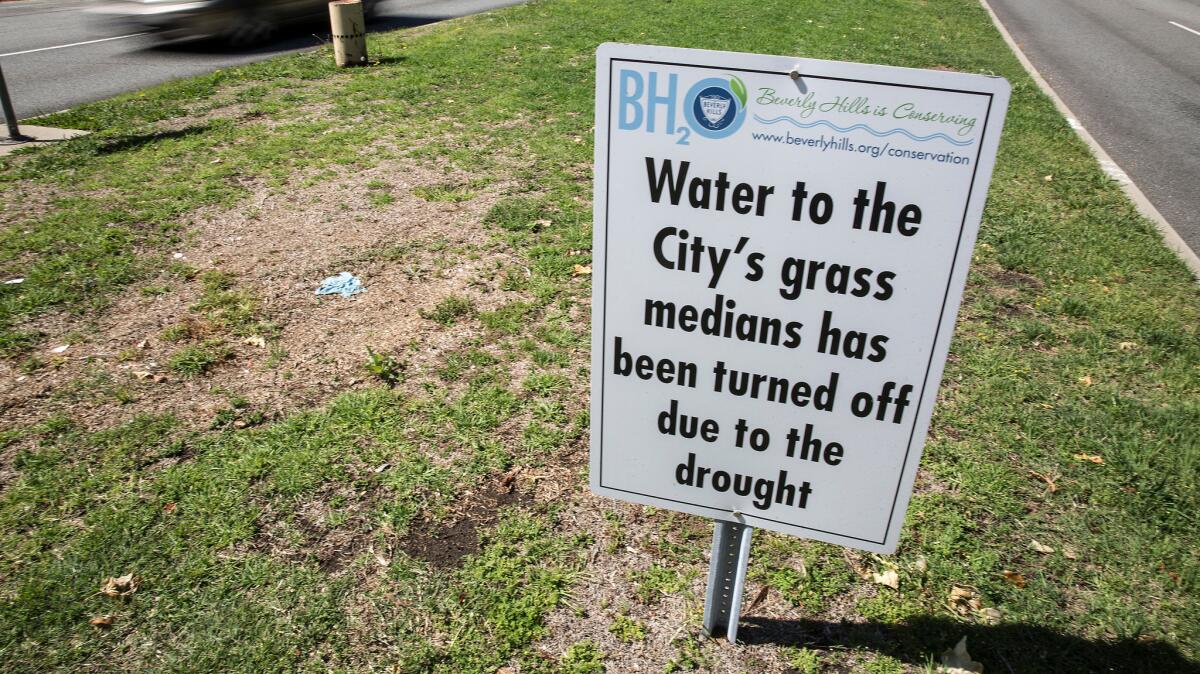What drought? Many Californians no longer required to curb water use

After a year of mandatory water conservation that shortened showers and faded lawns, millions of drought-weary Californians will no longer be required to aggressively cut back their use.
In order to comply with the state’s latest emergency regulation, local water providers this week submitted documents intended to demonstrate whether their agencies have enough supply to meet customers’ demands for another three severely dry years.
The State Water Resources Control Board has not publicly posted the documents. But officials at several Southern California water providers said that they have enough water to pass the board’s “stress test.” Those agencies subsequently determined that no mandatory water conservation will be necessary over the next seven months. (The state regulations expire at the end of January.)
For example, the Los Angeles Department of Water and Power had most recently been under orders to cut its water use by 14% compared with 2013. In a statement, officials on Thursday said that restriction was no longer in effect, but urged customers to keep conserving.
Coachella Valley Water District, which at one point was told to cut its water use by 36%, also determined it has more than enough water to set its target at 0%. The area relies on a vast underground aquifer for much of its supply.
In calculations submitted to the state, district officials said they have about 10 million more acre feet of water than they need to meet their customers’ demand.
They said customers had saved about 9.5 billion gallons of water since June 2015, reducing their consumption by about 25%.
“We expect our customers will be able to voluntarily maintain these reduced levels of water use,” General Manager Jim Barrett said in a statement. “If not, new mandates may be developed,”
The water district was one of four that the state fined last year for failing to meet their savings mandates.
Beverly Hills, which also was fined, said in a statement Friday that it had submitted a conservation target of 0% to the state, but locally “an aggressive water conservation program” remains in place. To comply with that program, residents will need to continue to cut their water usage by 30% until officials adopt a new target.
The Long Beach Water Department also determined it has enough water to meet future demands.
State regulators will review suppliers’ calculations this week and reserve the right to reject them if something appears “materially false,” said Max Gomberg, the water board’s climate and conservation manager.
“Even if lots of agencies come up with zero [percent], their customers may continue to conserve at significant levels,” Gomberg said.
Water wholesalers that sell their supply to local retail agencies such as the DWP were also required to submit an analysis to the state this month. The Metropolitan Water District of Southern California found it has enough water to meet its customers’ future demands.
Some of MWD’s member agencies, such as Beverly Hills, said the wholesaler’s forecast influenced their own.
“We are constantly assessing conditions to ensure we have sufficient supplies,” Metropolitan General Manager Jeffrey Kightlinger said in a statement. “That said, if we have an exceptional drop in supplies, or an unusual spike in demand, we will absolutely turn to our other tools … to ensure that we maintain water reliability.”
Like its northern neighbor, the Municipal Water District of Orange County said it had enough water to meet the state’s stress test. But the agency also called on residents to voluntarily reduce water consumption by 10%.
In a nod to the state’s improved hydrology, the water board approved changes to the emergency regulation that allowed water districts to set their own conservation standards.
However, when regulators proposed the stress test in May, some experts and environmental advocates worried that many local agencies would end mandatory conservation if given the chance.
Tracy Quinn, a water policy analyst for the Natural Resources Defense Council, said the slew of 0% targets sends a “confusing message to Californians.”
“It’s certainly not the time to back off of conservation,” Quinn said. “We did such a great job of getting people to change their behaviors … and now we’re saying, ‘Oh the drought’s over’ — and that’s simply not the case.”
Water districts are inherently interested in selling more water — not less, Quinn added. And history has shown that voluntary conservation isn’t typically effective.
The water board’s Gomberg said regulators would assess California’s conservation throughout the summer, and “go from there.”
Twitter: @ByMattStevens
ALSO
L.A. voters to decide this fall whether to overhaul how the DWP is run
At least 2 dead, 100 structures lost in monster fire; state of emergency declared
Meningococcal outbreak in Los Angeles and Orange counties triggers health warning
More to Read
Sign up for Essential California
The most important California stories and recommendations in your inbox every morning.
You may occasionally receive promotional content from the Los Angeles Times.











